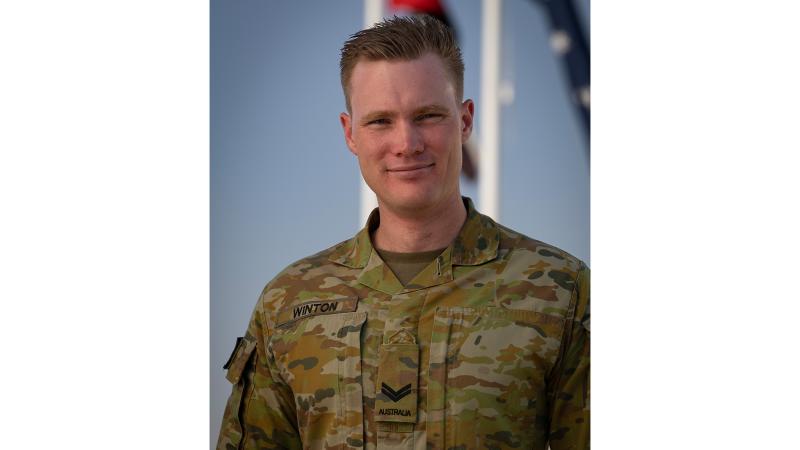9 June 2023
Almost 50 years ago, Army recruiters visited Linda Lane’s high school in Toowoomba, Queensland, and introduced the students to a list of jobs they could do in the Army.
Back then, females who enlisted in the Army joined the Women’s Royal Australian Army Corps (WRAAC).
Now a Warrant Officer Class Two (WO2), she recalls the list of opportunities available to women being limited to cooks, drivers, clerks and signals operators.
“Operator Signals involved understanding Morse code and that was the highest paid job, so from Year 10, I knew that was what I wanted to do when I left school,” WO2 Lane said.
After enlisting in the WRAAC on October 3, 1978, WO2 Lane completed recruit training at ‘WRAAC School’ in Sydney.
Halfway through the course the students were advised that they would receive pay parity with their male counterparts.
“When I enlisted, female Operator Signals were paid 95 per cent of what their male counterparts were paid,” WO2 Lane said.
“We were soldiers and we did the same job as the males, but we were also ladies who wore black leather gloves and carried handbags.”
In 1984, the WRAAC was disbanded and its members transferred to the corps they were working in.
WO2 Lane transferred to the Royal Australian Corps of Signals, while posted to 7th Signal Regiment at Cabarlah near Toowoomba.
“Other than our uniforms, the only thing that changed was that we were allowed to use weapons,” WO2 Lane said.
“At WRAAC school a male soldier came and showed us a self loading rifle. He took it apart in front of us but we weren’t allowed to touch it.”
In 1985, seven years after enlisting, WO2 Lane learnt how to handle and perform drills with a self loading rifle.
Between 1988 and 1990, WO2 Lane gained deployment experience in Bamaga near the northern tip of Cape York in far north Queensland, where she was able to see the results of her work as an Operator Signals in real time and experience being a part of a remote Aboriginal and Torres Strait Islander community.
It was a deployment opportunity she cherished during post-Vietnam War peacetime.
At the end of 1999, after 21 years of service, WO2 Lane discharged at the rank of Warrant Officer Class Two.
“By that stage, I’d had three children whilst working full time,” WO2 Lane said.
“And I’d completed a Bachelor of Teaching at the University of Southern Queensland via distance education.
“I wanted to use my teacher’s degree to work as a primary school teacher after discharging so I completed a Graduate Diploma in Early Childhood.”
WO2 Lane returned to the Army in 2003 as a Reservist at 7th Signal Regiment, balancing her reserve work with casual teaching at a number of local primary schools.
“I signed on to do reserve work three to four days a week, job sharing with the training warrant officer at the regiment,” WO2 Lane said.
WO2 Lane continued in the role until 2020 and was awarded an Australia Day Medallion in 2021 in appreciation of her outstanding dedication to duty.
“It was a busy time,” WO2 Lane said.
“I had also started a cleaning business so I was essentially juggling up to three jobs whilst being a single mum.”
After reaching compulsory retirement age, WO2 Lane started working reserve days as 7th Signal Regiment community engagement officer.
On May 31, WO2 Lane was presented with the first, second, third and fourth clasps to the Defence Long Service Medal and the Federation Star for 40 years of service by Commander Forces Command Major General Susan Coyle, at Borneo Barracks, Cabarlah, Queensland.
“I had previously been awarded the original Defence Service Medal but I wanted my Reserve work to be recognised as well so I returned it to Honours and Awards in order to become eligible for the current Long Service Medal and Clasps,” WO2 Lane said.
“When I left school, women were expected to become checkout chicks or get married and have babies.
“It’s been 45 years since I joined the Army and the changes in our electronic warfare trade are extraordinary.
“I’ve jumped out of a plane, driven trucks, fired weapons, obtained qualifications in mine warfare, munitions and explosive ordnance, instructed recruits and junior soldiers, travelled all over Queensland and the Northern Territory on exercise and worked with wonderful people.
“I’ve experienced more than I could have imagined and if I could do it all over again, I wouldn’t change a thing.”


